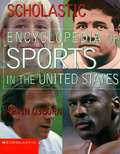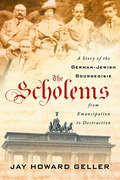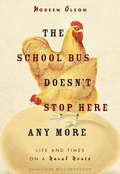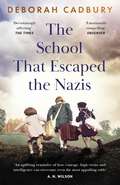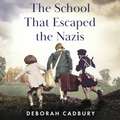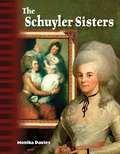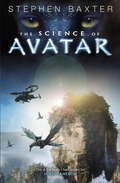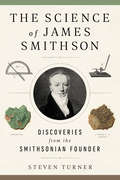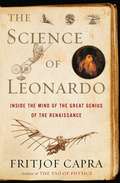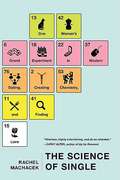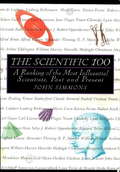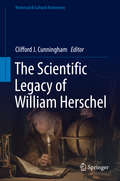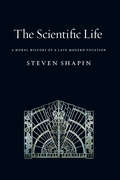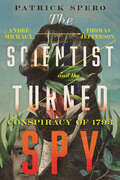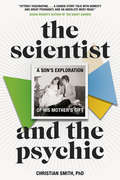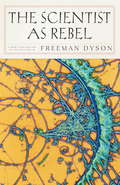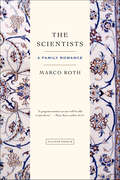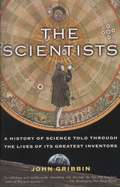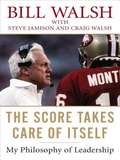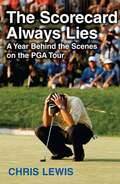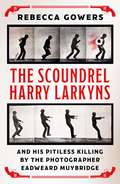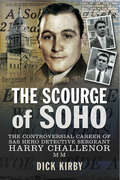- Table View
- List View
The Scholastic Encyclopedia of Sports in the United States
by Kevin OsbornThis volume explores the fascinating history of American sports, from being the Devil's pastime in Puritan New England to the celebrity-filled big business it is today. Readers will learn about many stars as well as less famous athletes, and the personal attributes of players that make them outstanding and influential people.
The Scholems: A Story of the German-Jewish Bourgeoisie from Emancipation to Destruction
by Jay Howard GellerThe evocative and riveting stories of four brothers—Gershom the Zionist, Werner the Communist, Reinhold the nationalist, and Erich the liberal—weave together in The Scholems, a biography of an eminent middle-class Jewish Berlin family and a social history of the Jews in Germany in the decades leading up to World War II.Across four generations, Jay Howard Geller illuminates the transformation of traditional Jews into modern German citizens, the challenges they faced, and the ways that they shaped the German-Jewish century, beginning with Prussia's emancipation of the Jews in 1812 and ending with exclusion and disenfranchisement under the Nazis. Focusing on the renowned philosopher and Kabbalah scholar Gershom Scholem and his family, their story beautifully draws out the rise and fall of bourgeois life in the unique subculture that was Jewish Berlin. Geller portrays the family within a much larger context of economic advancement, the adoption of German culture and debates on Jewish identity, struggles for integration into society, and varying political choices during the German Empire, World War I, the Weimar Republic, and the Nazi era. What Geller discovers, and unveils for the reader, is a fascinating portal through which to view the experience of the Jewish middle class in Germany.
The School
by Henry Viscardi Jr.The true story of a man who opened a K-12 school for children with physical disabilities in the early 1960s. Describes the accomplishments of the children, many of whom had seldom been out of their homes. The book also describes the opposition and discrimination the school's founders faced when the local residents decided they didn't want the school to be built in their neighborhood
The School Bus Doesn't Stop Here Anymore
by Will Ferguson Noreen OlsonWelcome to Noreen Olson's kitchen table, where everything happens. She loves birds, animals, family, children, friends, growing things and life on the farm, and writes about them and all the odd situations they manage to get into with engaging liveliness. Many of the pieces are humorous, but more than that, they are heartwarming and true. In them you will see reflections of your own loves, life, guilt, laughter, nostalgia, memories and beliefs.All of the animals, people and incidents are real (though Noreen admits that she is prone to the occasional slight exaggeration) and names have been changed for "her own protection". The titles of the short tales say it all: Saving the Preemie Calf, My Career As an Egg Grader, Lament for a Lousy Garden, Kitchen Archaeology, Embarrassing the Kids, The Lawn Ornament Vendetta and One More Way to Ruin a Party.Noreen Olson has been writing these true tales in her biweekly column for more than twenty-three years, and collected them in six books. These stories are the best of the best, together with newly written introductions to thematic groupings, and an introduction by Will Ferguson.
The School That Escaped the Nazis
by Deborah Cadbury'All the violence I had experienced before felt like a bad dream. It was a paradise. I think most of the children felt it was a paradise.'In 1933, as Hitler came to power, schoolteacher Anna Essinger hatched a daring and courageous plan: to smuggle her entire school out of Nazi Germany. Anna had read Mein Kampf and knew the terrible danger that Hitler's hate-fuelled ideologies posed to her pupils. She knew that to protect them she had to get her pupils to the safety of England. But the safe haven that Anna struggled to create in a rundown manor house in Kent would test her to the limit. As the news from Europe continued to darken, Anna rescued successive waves of fleeing children and, when war broke out, she and her pupils faced a second exodus. One by one countries fell to the Nazis and before long unspeakable rumours began to circulate. Red Cross messages stopped and parents in occupied Europe vanished. In time, Anna would take in orphans who had given up all hope; the survivors of unimaginable horrors. Anna's school offered these scarred children the love and security they needed to rebuild their lives, showing them that, despite everything, there was still a world worth fighting for.Featuring moving first-hand testimony, and drawn from letters, diaries and present-day interviews, The School That Escaped the Nazis is a dramatic human tale that offers a unique child's-eye perspective on Nazi persecution and the Holocaust. It is also the story of one woman's refusal to allow her beliefs in a better, more equitable world to be overtaken by the evil that surrounded her.
The School That Escaped the Nazis
by Deborah CadburyThe extraordinary true story of progressive schoolteacher, Anna Essinger, the woman who defied Hitler, smuggling her school and its pupils from Nazi Germany to the safety of England.'All the violence I had experienced before felt like a bad dream. It was a paradise. I think most of the children felt it was a paradise.'In 1933, as Hitler came to power, schoolteacher Anna Essinger hatched a daring and courageous plan: to smuggle her entire school out of Nazi Germany. Anna had read Mein Kampf and knew the terrible danger that Hitler's hate-fuelled ideologies posed to her pupils. She knew that to protect them she had to get her pupils to the safety of England. But the safe haven that Anna struggled to create in a rundown manor house in Kent would test her to the limit. As the news from Europe continued to darken, Anna rescued successive waves of fleeing children and, when war broke out, she and her pupils faced a second exodus. One by one countries fell to the Nazis and before long unspeakable rumours began to circulate. Red Cross messages stopped and parents in occupied Europe vanished. In time, Anna would take in orphans who had given up all hope; the survivors of unimaginable horrors. Anna's school offered these scarred children the love and security they needed to rebuild their lives, showing them that, despite everything, there was still a world worth fighting for.Featuring moving first-hand testimony, and drawn from letters, diaries and present-day interviews, The School That Escaped the Nazis is a dramatic human tale that offers a unique child's-eye perspective on Nazi persecution and the Holocaust. It is also the story of one woman's refusal to allow her beliefs in a better, more equitable world to be overtaken by the evil that surrounded her.(P) 2022 Hodder & Stoughton Limited
The Schoolmaster: A Commentary Upon the Aims and Methods of an Assistant-master in a Public School
by AC BensonThe Schoolmaster was originally published at the turn of the 20th century, when the world was a very different place, and yet Benson's strikingly honest words about his chosen profession are, in the main, still relevant today. Benson was born at Wellington College, educated at Eton and Cambridge and spent his life and career at both. He also had a very successful career outside of education; he was a prolific writer, the editor of Queen Victoria's letters, lyricist and prolific diary writer.
The Schuyler Sisters
by Monika DaviesIn The Schuyler Sisters, readers will learn about the fascinating lives of Eliza and Angelica Schuyler, their influence on Alexander Hamilton and United States history, and the roles of women in the 1700s-1800s. Through the use of dynamic primary sources like maps and letters, middle school students will be engaged as they read about history and build their literacy skills. Supporting today's social studies standards, this full-color text includes intriguing images, interesting sidebars, a glossary, and other important text features to support learning and strengthen key comprehension skills.
The Science of Avatar
by Stephen BaxterJames Cameron's Avatar is the biggest movie of all time. Now the movie's legendary director has leant his support to an exploration of the world of Pandora with bestselling science-fiction author Stephen Baxter. From journeys into deep space to anti-gravity unobtanium, from Pandora's extraordinary flora and fauna to transferring consciousness, Baxter and Cameron reveal that we are often closer to world of Avatar than we might imagine.Stephen Baxter is the master of `what-if?' science fiction. In THE SCIENCE OF AVATAR he's written a book that will appeal to fans of both science-fiction and popular science. THE SCIENCE OF AVATAR will offer fans the unique opportunity to explore the spectacular world of Pandora, from the creator himself.
The Science of James Smithson: Discoveries from the Smithsonian Founder
by Steven TurnerAccessible exploration of the noteworthy scientific career of James Smithson, who left his fortune to establish the Smithsonian Institution. James Smithson is best known as the founder of the Smithsonian Institution, but few people know his full and fascinating story. He was a widely respected chemist and mineralogist and a member of the Royal Society, but in 1865, his letters, collection of 10,000 minerals, and more than 200 unpublished papers were lost to a fire in the Smithsonian Castle. His scientific legacy was further written off as insignificant in an 1879 essay published through the Smithsonian fifty years after his death--a claim that author Steven Turner demonstrates is far from the truth.By providing scientific and intellectual context to his work, The Science of James Smithson is a comprehensive tribute to Smithson's contributions to his fields, including chemistry, mineralogy, and more. This detailed narrative illuminates Smithson and his quest for knowledge at a time when chemists still debated thing as basic as the nature of fire, and struggled to maintain their networks amid the ever-changing conditions of the French Revolution and the Napoleonic Wars.
The Science of Leonardo: Inside the Mind of the Great Genius of the Renaissance
by Fritjof CapraLeonardo da Vinci¿s pioneering scientific work was virtually unknown during his lifetime. Leonardo was in many ways the un-acknowledged ¿father of modern science. ¿ Drawing on an examination of over 6,000 pages of Leonardo¿s surviving Notebooks, Capra explains that Leonardo approached scientific knowledge with the eyes of an artist. Through his studies of living and non-living forms, from architecture and human anatomy to the turbulence of water and the growth patterns of grasses, he pioneered the empirical, systematic approach to the observation of nature -- what is now known as the scientific method. ¿A fresh and important portrait of a colossal figure in the world of science and the arts. ¿ Includes 50 beautiful sepia-toned illustrations.
The Science of Single
by Rachel MachacekRead Rachel Machacek's blogs and other content on the Penguin Community. One year of dating. One year of looking for love. One uproarious and touching memoir. After years of dating without a connection, Rachel Machacek vowed to try a more dedicated, less slipshod, more scientific way of finding love. So, she committed a year of her life to trying every mainstream (and not-so-mainstream) method of meeting the right guy. In The Science of Single, Rachel welcomes readers into the findings from her roller- coaster year, and although she set out looking for the right chemistry, what she discovers in the process is hilarious, unexpected, and infinitely more exciting. Watch a Video .
The Scientific 100
by John Lynda SimmonsWho are the great scientists throughout the ages, and what exactly did they do to earn their importance? From Archimedes to Newton to Einstein to Hawking, The Scientific 100 provides the fascinating answers. Vivid biographical sketches chronicle the lives and accomplishments of the world's preeminent scientists. And in the tradition of the Citadel Press 100 Series, they are ranked provocatively in order of influence--an inspiration for lively discussion. This unique volume is a browser's treasure trove and a handy reference for the general reader. John Simmons has been associated with Current Biography for more than fifteen years. He has written frequently about Nobel laureates in science. A member of the New York Academy of Sciences, he divides his time between New York City and Paris.
The Scientific 100
by Lynda Simmons John SimmonsWho are the great scientists throughout the ages, and what exactly did they do to earn their importance? From Archimedes to Newton to Einstein to Hawking, The Scientific 100 provides the fascinating answers. Vivid biographical sketches chronicle the lives and accomplishments of the world's preeminent scientists. And in the tradition of the Citadel Press 100 Series, they are ranked provocatively in order of influence--an inspiration for lively discussion.This unique volume is a browser's treasure trove and a handy reference for the general reader.John Simmons has been associated with Current Biography for more than fifteen years. He has written frequently about Nobel laureates in science. A member of the New York Academy of Sciences, he divides his time between New York City and Paris.
The Scientific Legacy of William Herschel
by Clifford J. CunninghamThis book presents a modern scholarly analysis of issues associated with England'smost famous astronomer, William Herschel. The world's leading experts onHerschel, discoverer of the planet Uranus, here offer their combined wisdom on manyaspects of his life and astronomical research. Solar system topics includecomets, Earth's Moon, and the spurious moons of Uranus, all objects whose observation was pioneered by Herschel. The contributors examine his study of thestructure of the Milky Way and an in-depth look at the development of the front view telescopes he built. The popular subject of extraterrestriallife is looked at from the point of view of both William Herschel and his sonJohn, both of whom had an interest in the topic. William's personal development through the educational system of the lateeighteenth-century is also explored, and the wide range of verse and satire invarious languages associated with his discoveries is collected here for thefirst time. Hershel worked at a time of incredible discovery, and his work is still highly regarded in the field. Here it is given a thorough investigation which puts into context and perspective his path breaking career.
The Scientific Life: A Moral History of a Late Modern Vocation
by Steven ShapinConventional wisdom has long held that scientists are neither better nor worse than anyone else, that personal virtue does not necessarily accompany technical expertise, and that scientific practice is profoundly impersonal. Shapin, however, here shows how the uncertainties attending scientific research make the virtues of individual researchers intrinsic to scientific work. Further, Shapin argues that the radical uncertainties of much of contemporary science have made personal virtues more central to its practice than ever before, and he also reveals how radically novel aspects of late modern science have unexpectedly deep historical roots.
The Scientist Turned Spy: André Michaux, Thomas Jefferson, and the Conspiracy of 1793 (Jeffersonian America)
by Patrick SperoThe incredible story of an explorer caught up in international intrigue at the dawn of US history André Michaux was the most accomplished scientific explorer of North America before Lewis and Clark. His work took him from the Bahamas to Hudson Bay, and it is likely that no contemporary of his had seen as much of the continent. But there is more to his story. During his decade-long American sojourn, Michaux found himself thrust into the middle of a vast international conspiracy. In 1793, the revolutionary French government conscripted him into its service as a secret agent and tasked him with organizing American frontiersmen to attack Spanish-controlled New Orleans, seize control of Louisiana, and establish an independent republic in the American West. New evidence also strongly implicates Thomas Jefferson in this plot. Drawing on sources buried in the vault of the American Philosophical Society, Patrick Spero offers a bona fide page-turner that sheds new light on an incipient American political climate that fostered reckless diplomatic ventures under the guise of scientific exploration, revealing the air of uncertainty and opportunity that pervaded the early republic.
The Scientist and the Psychic: A Son's Exploration of His Mother's Gift
by Christian SmithWeaving together the story of his fractured relationship to his mother with research into her paranormal abilities, Dr. Christian Smith has created, in The Scientist and the Psychic, a captivating, one-of-a-kind memoir of belief, skepticism and familial love.Christian Smith realized his mother was different in the autumn of 1977 when he was eight years old. Before then, he'd witnessed séances at home and the kids at school sometimes teased him about his mom being a witch--so he sensed that his life wasn't typical. But it wasn't until he was backstage at a renowned concert venue in Toronto, watching from behind a curtain as Geraldine commanded an audience of 2,000 with her extrasensory readings, that he understood she was special. As Geraldine's only child, he would assume the role of the quiet observer while she guided a live CBC broadcast of a séance; made startling and consistently accurate predictions; and eventually moved to LA to work with the parents of murder victims--and with convicted murderer Jeffrey R. MacDonald. Over time, the high profile and emotionally depleting work affected Geraldine's health and relationships. Addiction took over her life, and her son pulled away. Fast forward to the present day: Christian is a molecular biologist and Geraldine is retired and in poor health. They are closer than they've ever been, and now he gives us the story of her undeniable perceptual abilities and pioneering work as a psychic--and endeavours to make scientific sense of it.
The Scientist as Rebel
by Freeman J. DysonFrom Galileo to today's amateur astronomers, scientists have been rebels, writes Freeman J. Dyson. Like artists and poets, they are free spirits who resist the restrictions their cultures impose on them. In their pursuit of nature's truths, they are guided as much by imagination as by reason, and their greatest theories have the uniqueness and beauty of great works of art.Dyson argues that the best way to understand science is by understanding those who practice it. He tells stories of scientists at work, ranging from Isaac Newton's absorption in physics, alchemy, theology, and politics, to Ernest Rutherford's discovery of the structure of the atom, to Albert Einstein's stubborn hostility to the idea of black holes. His descriptions of brilliant physicists like Edward Teller and Richard Feynman are enlivened by his own reminiscences of them. He looks with a skeptical eye at fashionable scientific fads and fantasies, and speculates on the future of climate prediction, genetic engineering, the colonization of space, and the possibility that paranormal phenomena may exist yet not be scientifically verifiable. Dyson also looks beyond particular scientific questions to reflect on broader philosophical issues, such as the limits of reductionism, the morality of strategic bombing and nuclear weapons, the preservation of the environment, and the relationship between science and religion. These essays, by a distinguished physicist who is also a prolific writer, offer informed insights into the history of science and fresh perspectives on contentious current debates about science, ethics, and faith.
The Scientists: A Family Romance
by Marco RothA frank, intelligent, and deeply moving debut memoir from n+1 cofounder Marco RothWith the precociousness expected of the only child of a doctor and a classical musician—from the time he could get his toddler tongue to a pronounce a word like "De-oxy ribonucleic acid," or recite a French poem—Marco Roth was able to share his parents' New York, a world centered around house concerts, a private library of literary classics, and dinner discussions of the latest advances in medicine. That world ended when his father started to suffer the worst effects of the AIDS virus that had infected him in the early 1980s.What this family could not talk about for years came to dominate the lives of its surviving members, often in unexpected ways. The Scientists is a story of how we first learn from our parents and how we then learn to see them as separate individuals; it's a story of how precociousness can slow us down when it comes to knowing about our desires and other people's. A memoir of parents and children in the tradition of Edmund Gosse, Henry Adams, and J.R. Ackerley, The Scientists grapples with a troubled intellectual and emotional inheritance, in a style that is both elegiac and defiant.
The Scientists: A History of Science Told Through the Lives of Its Greatest Inventors
by John GribbinA wonderfully readable account of scientific development over the past five hundred years, focusing on the lives and achievements of individual scientists, by the bestselling author of In Search of Schrödinger's Cat. In this ambitious new book, John Gribbin tells the stories of the people who have made science, and of the times in which they lived and worked. He begins with Copernicus, during the Renaissance, when science replaced mysticism as a means of explaining the workings of the world, and he continues through the centuries, creating an unbroken genealogy of not only the greatest but also the more obscure names of Western science, a dot-to-dot line linking amateur to genius, and accidental discovery to brilliant deduction. By focusing on the scientists themselves, Gribbin has written an anecdotal narrative enlivened with stories of personal drama, success and failure. A bestselling science writer with an international reputation, Gribbin is among the few authors who could even attempt a work of this magnitude. Praised as "a sequence of witty, information-packed tales" and "a terrific read" by The Times upon its recent British publication, The Scientists breathes new life into such venerable icons as Galileo, Isaac Newton, Albert Einstein and Linus Pauling, as well as lesser lights whose stories have been undeservedly neglected. Filled with pioneers, visionaries, eccentrics and madmen, this is the history of science as it has never been told before.
The Score Takes Care of Itself: My Philosophy of Leadership
by Steve Jamison Bill Walsh Craig WalshThe last lecture on leadership by the NFL's greatest coach: Bill Walsh Bill Walsh is a towering figure in the history of the NFL. His advanced leadership transformed the San Francisco 49ers from the worst franchise in sports to a legendary dynasty. In the process, he changed the way football is played. Prior to his death, Walsh granted a series of exclusive interviews to bestselling author Steve Jamison. These became his ultimate lecture on leadership. Additional insights and perspective are provided by Hall of Fame quarterback Joe Montana and others. Bill Walsh taught that the requirements of successful leadership are the same whether you run an NFL franchise, a fortune 500 company, or a hardware store with 12 employees. These final words of 'wisdom by Walsh' will inspire, inform, and enlighten leaders in all professions.
The Scorecard Always Lies: A Year Behind the Scenes on the PGA Tour
by Chris LewisAs Tiger Woods broke down in tears on the 18th green at Royal Liverpool Golf Club, legions of spectators strained their eyes to read the emotion on his face. Like the millions watching on television, they knew that Tiger had just won the British Open, and that his father had recently died. Beyond that, however, they knew precious little -- only that he played with a Nike golf ball, carried an American Express card in his wallet, and, presumably, drove a Buick. They were hungry for more, but everything else about his off-course life, and those of his fellow pros, was forbiddingly well-guarded. Until now. InThe Scorecard Always LiesveteranSports Illustratedgolf correspondent Chris Lewis reaches past the results, stats, and sound-bites to focus on the personalities and personal lives of the sport's top players. While embracing all the drama and excitement of the 2006 PGA Tour season, he takes us inside the locker rooms, hotel rooms, and private planes to deliver an unrivaled, behind-thescenes look at the Tour and the men who play it. Lewis spent thirty weeks of the 2006 season on the road with the best golfers in the world, exploring their backstories, motivations, and preoccupations, and collecting telling, character-revealing tales. He bore witness to both the hard work and the privilege that frame their lifestyles. But he also discovered a Tour that to this point remained largely unknown -- one where a player while pursuing dreams of glory might also be suing his agent, going through a messy divorce, or looking to throw down in the locker room with one of his peers. There's John Daly trying to explain how his wife has just been taken off to jail. There's Chris Couch making a midnight, barefoot run through a derelict district of New Orleans, fearing he was about to be kidnapped, and taking refuge in a tattoo parlor. We watch as Tiger Woods tries to deal with losing his father to cancer, while refusing to abandon his fondness for blue humor. We see Phil Mickelson hanging with rock stars, sharing a Masters victory gift with a national championship-winning college football coach, and hooking up a sportswriter with a would-be groupie's phone number. All in all, we get a rare glimpse of the off-course lives of the Tour's stars and their supporting cast. At turns humorous, touching, and insightful, the book sheds new light on every aspect of Tour life, from easygoing Tuesday practice rounds to feverpitch Sunday showdowns, always taking care to show how their off-course concerns inform their every swing. Fans will savor the fullest portrait yet of a group of players who, throughout their successes and struggles, remain unfailingly smart, funny, and engaging, and make up the most intriguing subculture in all of sports.
The Scoundrel Harry Larkyns and his Pitiless Killing by the Photographer Eadweard Muybridge
by Rebecca GowersSHORTLISTED FOR THE HWA NON-FICTION CROWNDiamond thief, guerrilla fighter, spy, decorated hero, bohemian rogue and lover of several notorious women - all describe Major Harry Larkyns. Yet he has long been dismissed as merely a liar and a cheat, famous only for being shot dead in 1874 by the unnerving photographer Eadweard Muybridge. But has history properly understood either the killer or his victim? Part biography, part crime investigation, THE SCOUNDREL HARRY LARKYNS uncovers some extraordinary truths, and is historical detective work at its finest.'One of the best books of the year' Irish Times'Strange, brilliant, quirky and illuminating' Country Life'A story that is as eventful as it is tragic' Guardian'A masterpiece of historical detective work' Keith Lowe
The Scourge of Soho: The Controversial Career of SAS Hero Detective Sergeant Harry Challenor MM
by Dick KirbyThe Scourge of Soho describes the dramatic and eventful life of Detective Sergeant Harry Challenor MM and at the same time lifts the lid on front-line policing and the murky world of Soho criminals in the 1950s and 1960s.Born into grinding poverty in 1922, Challenor fought with the Special Air Service during the Second World War, being parachuted behind enemy lines, captured twice, escaping twice. He was awarded the Military Medal.Joining the post-war Metropolitan Police, challenor spent four years with the elite Flying Squad, before being sent to clear up crime in Soho. Pimps, racketeers and crooks were rounded-up and often found themselves in possession of a bewildering assortment of armaments of which they denied all knowledge. More sensible gangsters, like Reg and Ron Kray, took off as soon as his name was mentioned.Challenor could not be frightened or bought-off, so the gang leaders put up a 1,000 reward to anyone who could frame him. In the end, it was not needed. During a political demonstration in 1963, half-bricks were planted on innocent protesters and three young policemen were imprisoned and Challenor certified as a paranoid schizophrenic and sent to a succession of psychiatric hospitals and care homes. Policeman-turned-author, Dick Kirby has interviewed former friends and colleagues of this determined but flawed character and has meticulously studied court records and official documents. The result is a sensational and gripping account of the man who became The Scourge of Soho.As featured in the East Anglian Daily Times, Bury Mercury and Wolverhampton Magazine.
